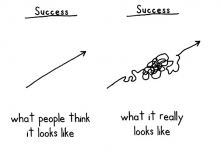
By Kendall Rawls, The Rawls Group
Looking forward is easy to do, especially when you’re dreaming of the next step in ramping up your auto dealership business. However, the words “succession planning” aren’t often uttered in dreams, and many owners of auto dealerships take one of two views: it’s either, “We aren’t there yet” or “I’m done: my estate plan is all buttoned up.”
To many owners, the idea of succession planning reflects the end since it’s a strategy for a buy-sell, exit, retirement, taxes and what happens to the estate after death. In fact, it should be considered the opposite. Succession planning is just the beginning.
Is Your Perception of “Planning” Getting in the Way of Building Business Value?
For starters, it’s important that you get past the idea that succession planning heralds your immediate retirement or demise. Once you can get past the negatives, it will help you consider important contingencies around your (or a family member’s) potential incapacitation, an exit strategy and estate and financial planning. However, it’s also important to remember that those are only parts of the whole and discussing them does not mean the end is near. It means there’s a viable plan to protect your family and business if the unexpected were to happen.
If you have taken steps to address such contingencies, congratulations: you are further along than many. But don’t stop there (as many dealers do). You need to go further and focus on the often-overlooked elements that create value and build the foundation for sustainable success in the future, described in the next paragraphs.
The Business
Change is all around us. Shifting generational perspectives and advancements in technology are affecting how dealers find and keep talent and craft their approaches to selling and service. Add into the mix regulatory policies, manufacturer mandates and market disrupters, and it gets quite complex. Dealers, now more than ever, must think ahead to leverage strengths and opportunities and either embrace innovation or accept the possibility of decreasing market share.
Strategic planning is critical and often overlooked by dealers as a part of the succession planning process. This planning involves the participation of your key leaders and develops and refines your mission, core values, and a three- to five-year vision with corresponding action steps to achieve identified objectives. Based upon the perspectives of those involved in the planning process, the strategic outcomes may focus on recruiting top talent, building bench strength, growing the business, identifying alternative revenue sources or simply finding better ways to sell more cars, service customers and drive profit.
Once your strategic plan is complete, it should include performance metrics and compensation plans tied to the achievement of the business’ strategic goals. This way, your plan will come alive rather than sit on the shelf, and you’ll understand if any part of it needs to be reworked.
The People
Are your people inspired by your culture and motivated to drive the needle? Your business can succeed now and into the future only if you have strong talent that is inspired by the organization’s mission and vision. This is evident by how much the company practices fulfilling the mission and vision every day. For example, if a core value of your operation is, “Our people are our family,” is that practiced in daily interactions between management and employees? Or is the business paying it lip service only?
Other hard questions that need to be asked are, “Are there high performers who behave counter to our company culture?” “Do we have a high employee turnover rate, and if so, why?” “How many people have left and boomeranged back into the organization?”
These issues can have powerful effects on employee morale, behavior and performance, which ultimately affect your bottom line. Bench strength, for every key area of your dealership, is essential for building value and positioning your organization for long-term success. If there are performers who are toxic to your culture, good talent will become frustrated and find other places to develop their careers, leaving you with fewer options to develop your bench. Consider:
- Identifying those with high potential, acknowledging their talent, and creating pathways for development into leadership roles.
- Identifying those who are high performers but working counter to your business’ culture. Clearly communicate organizational expectations to them. Put them on a short leash for sustained improvement or sever the relationship if that’s not possible.
- Creating a policy for boomerang employees to limit the re-entry to no more than one return. Do not allow under-performers or those who operate counter to your culture back into your organization.
The Family
Family members impact business decisions whether they are actively employed with the dealership or not. Perceptions and attitudes are never neutral. For example, if a spouse does not get along with a partner or key manager, it will create stress for everyone. Consider environments in which siblings, cousins, parents, nieces and nephews may be actively employed together and/or inactive shareholders. Perceptions and attitudes can make any simple environment complex, and the car business is anything but simple.
When multiple family members are present, a question we often get is, “How do you determine who will be successor while keeping positive family relationships?” This can be a dicey situation. If it’s not addressed carefully, resentment and fear of favoritism can create a cut-throat competitive environment among family members.
So, what do you do about the situation? Dealers who implement governance policies early in the succession planning process find agreements preclude disagreements. A best-case scenario is discussing, before family members are of age to enter the business, all possible contingencies of family influence on business decisions. This includes, but may not be limited to, requirements for:
- Employment: Prior employment, education, industry experience etc.
- Performance: Behaviors, attitudes, skills and knowledge will all affect employment, and family members should act as role models to other family employees.
- Consideration for leadership positions (further training, years of experience, etc.), successor-owners and shareholders.
One last item dealers often overlook is the definition of “family.” Family does not necessarily mean “blood relations.” Long-term employees, family friends, etc. can create as much acrimony in a business as blood relatives when emotions and expectations that can impact business decisions are involved. In addition to the items above, think about what additional agreements could help you create clearer expectations to avoid uncomfortable, challenging emotional discussions with those you care about.
The Self
Owner/leaders often overlook how their behaviors and attitudes influence the culture of the business. We find many dealers are perplexed because they don’t understand that, as much as they talk and work to ingrain certain core values and a specific culture in the dealership, it doesn’t seem to stick. This is usually due to a misalignment of a dealer’s behaviors and professed core values.
If a dealer is professing “team success” but the perception of the business is that it exists to fuel his or her lifestyle, it gives off a “WIIFM” (“what‘s in it for me”) mindset. This is an attitude that will play out negatively among managers and employees. However, if the owner/leader puts forth a “what’s in it for we” attitude, the behavior in the dealership will begin to mirror that of the owner.
Because dealership owners are at the top of the organizational chart, it’s often difficult for them to gain perspective on their own attitudes and leadership effectiveness. In these situations, consider hiring an experienced outside advisor, or even just confiding in a good friend. Gaining an outside perspective can go a long way in your journey to becoming an effective, insightful leader.
Rather than looking at succession planning as something you do to prepare for the end, consider the value it brings to your business by making it a starting point. It’s a wonderful process that allows you to begin with a vision while helping you build and grow your dealership well into the future. By actively engaging in the process, dealers can build a business that will provide opportunities for their family and the community, impact lives positively, fulfill their vision and sustain through multiple generations.
 Kendall Rawls understands the challenges that affect the success of an entrepreneurially owned business. Her unique perspective comes not only from her educational background, but from her experience as a second-generation family member and employee of The Rawls Group, a business succession planning firm based in Orlando. For more information, visit rawlsgroup.com or email info@rawlsgroup.com.
Kendall Rawls understands the challenges that affect the success of an entrepreneurially owned business. Her unique perspective comes not only from her educational background, but from her experience as a second-generation family member and employee of The Rawls Group, a business succession planning firm based in Orlando. For more information, visit rawlsgroup.com or email info@rawlsgroup.com.












